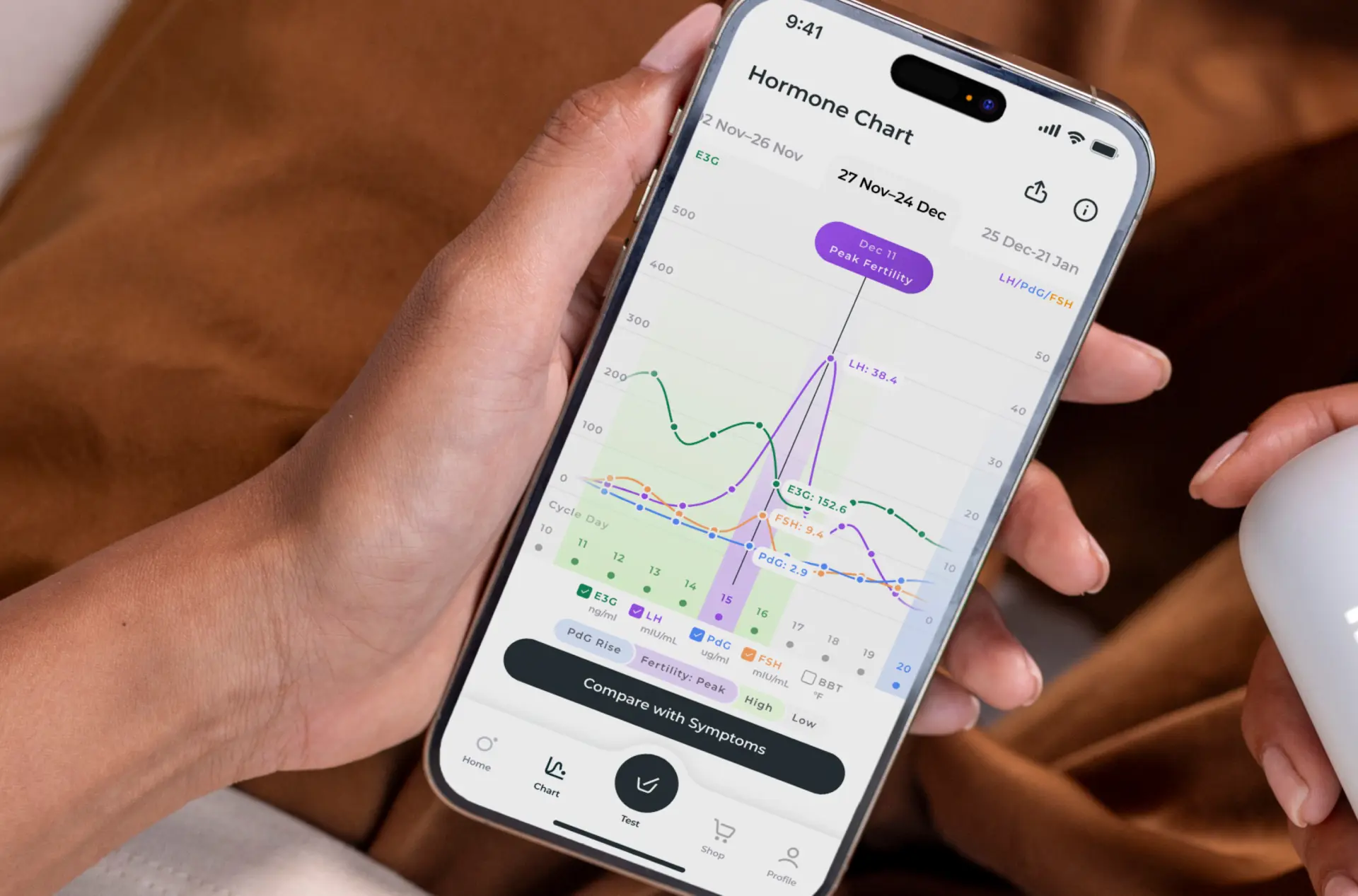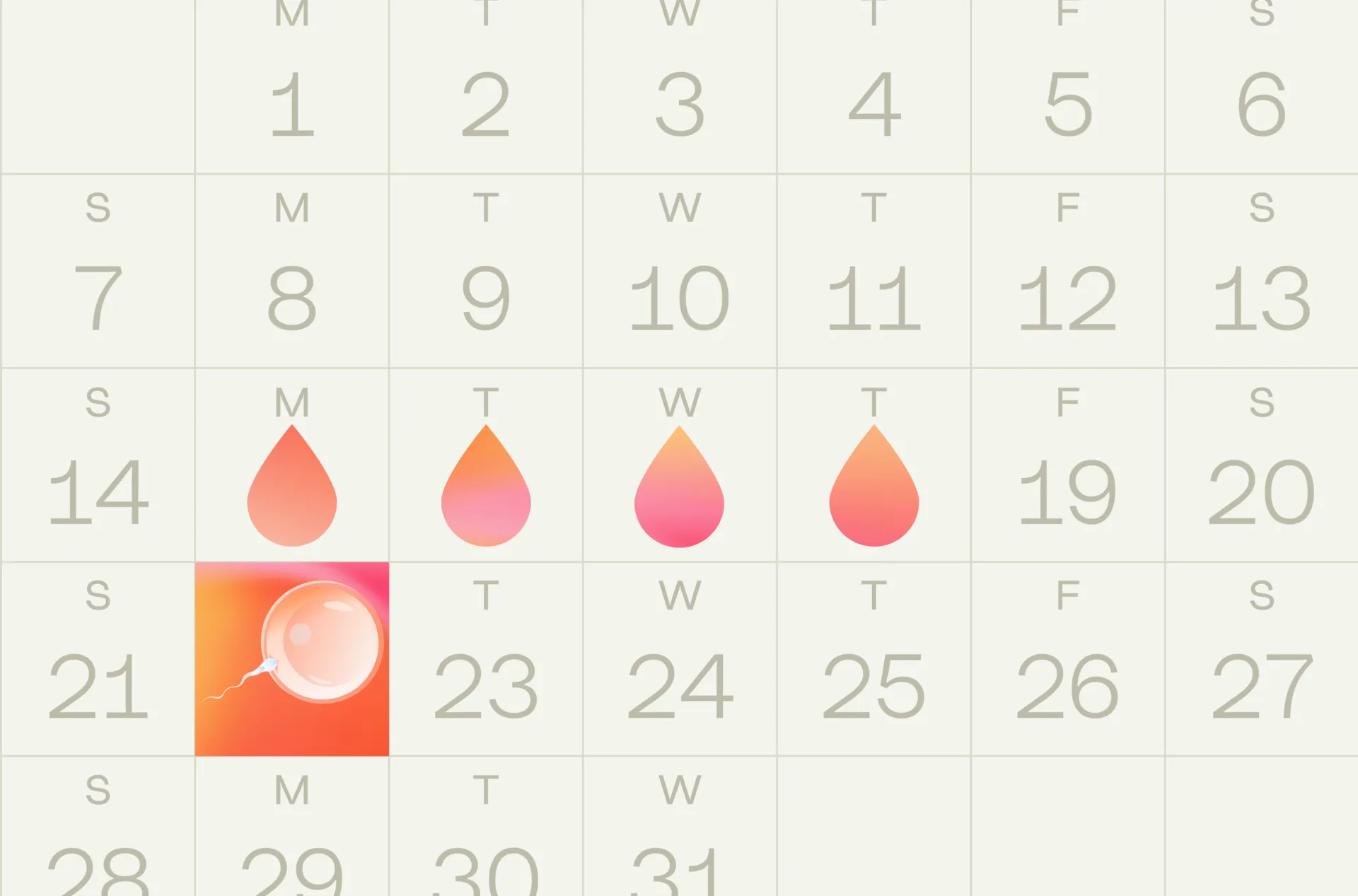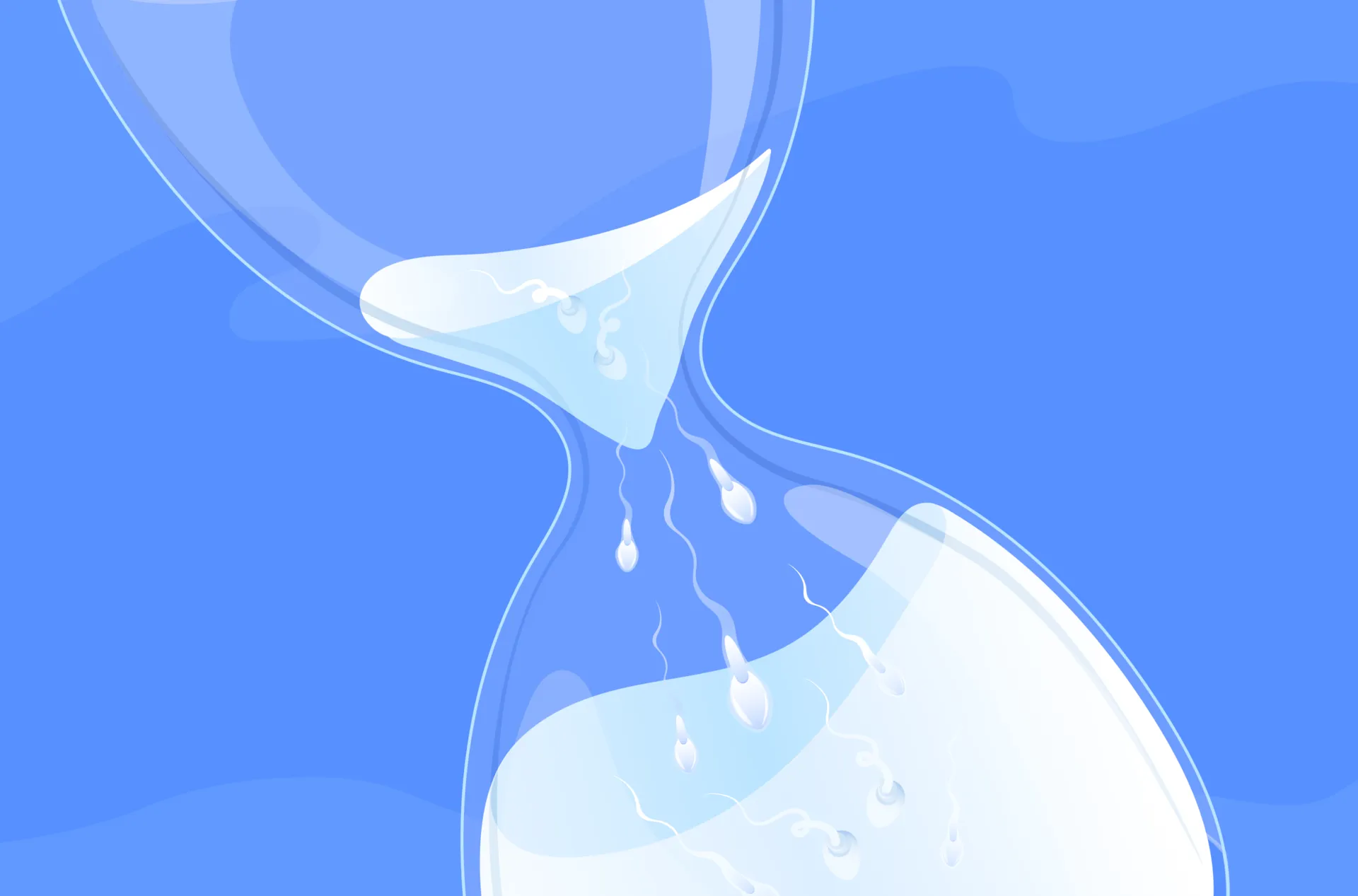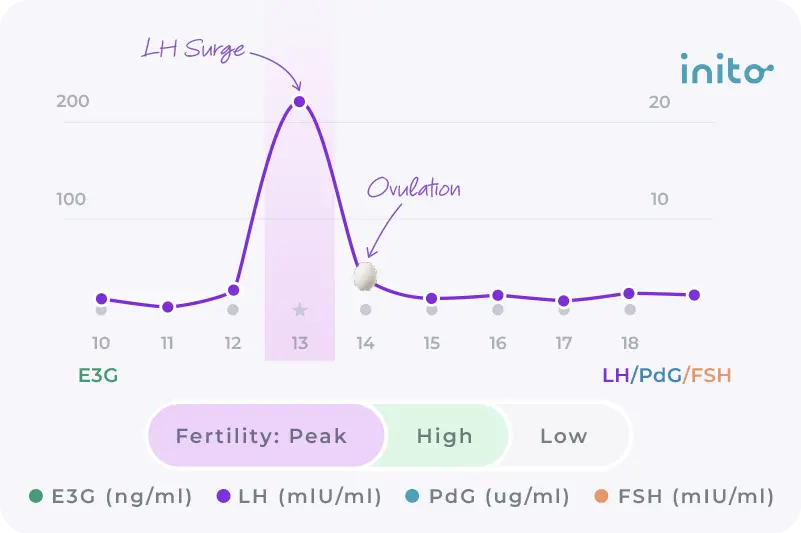Content table
If you’re pregnant and feeling down about a negative pregnancy test at 7 DPO, we feel you.
Are you wondering why you haven’t noticed any early signs yet?
This is more than normal, and it doesn’t mean this cycle is out. In fact, most women won’t even officially become pregnant until 8 DPO or later.
So breathe a sigh of relief because, at 7 DPO, it’s a bit too early to tell for sure what’s going on. In this article, you’ll learn all you need to know about 7 DPO symptoms if pregnant and early pregnancy testing.
Key takeaways
- 7 DPO refers to the seventh day past ovulation.
- At 7 DPO, your progesterone levels are higher. And implantation may have just happened or will be happening soon.
- 8 DPO – 10 DPO is the most common window for the embryo to implant into your uterine lining.
- Once implantation is successful, the pregnancy hormone, human chorionic gonadotropin (hCG), will begin rising too.
- These changing hormone levels could cause you to feel a variety of symptoms. Breast tenderness, bloating, abdominal discomfort, and fatigue are all normal 7DPO symptoms.
- At 7 DPO, it’s hard to know for sure if a symptom is caused by PMS or early pregnancy. But using a journal or fertility app like the Inito app can help you be better in tune with what’s normal for your menstrual cycle.
- If you’re taking a pregnancy test at 7 DPO, it will almost surely be negative. (This is assuming you tracked your DPO accurately). At 7 DPO, implantation likely hasn’t happened yet. And if it did, your hCG levels won’t be high enough to show on a test yet.
- To get the most reliable results on your pregnancy tests, wait until your missed period before testing. This will likely be around 14 DPO.
What is 7 DPO?
7 DPO means you are 7 Days Past Ovulation. This is an important time in your menstrual cycle when you are TTC because it’s right around implantation time.
How do I calculate my DPO?
Since DPO stands for “Days Past Ovulation” or “Days Post Ovulation”, it simply refers to the time that has passed since you ovulated.
Here’s an example.
If you ovulate on a Monday, Friday would be 4 DPO.
So, to figure out how many DPO you are, you need to know precisely when you ovulated. Ovulation Predictor Kits (OPKs) can help you estimate when you’re most likely to ovulate.
But a fertility monitor, like the Inito monitor, can help you actually confirm ovulation. This is because Inito’s fertility monitor uses one strip to measure 4 sex hormones, including PdG (a urine metabolite of progesterone).
Progesterone is the hormone that rises right after you ovulate. So measuring PdG is a super helpful marker for accurately tracking ovulation.
Now that you understand how to determine your DPO, let’s talk about what to expect at 7 DPO.
What’s happening 7 days after ovulation?
Here’s a full picture of what’s going on at 7 DPO:
- Your progesterone levels are on the rise because you recently ovulated. And if you become pregnant, this hormone will continue to rise even more.
- If the egg was fertilized, the embryo is in the process of implanting into your uterine lining. This can happen anywhere from 6 DPO to 12 DPO. However, 8 DPO to 10 DPO is the most common window for implantation.
- Once implantation is successful, your hCG levels will start rising. They will be very low at first, but they should nearly double every 48 hours.
With all that activity around this time, you may experience various symptoms. In the next section, we’ll go over 7 DPO symptoms and early pregnancy symptoms.
Know your chances of Ovulation!
Take our ovulation quiz to understand how your hormone patterns and
lifestyle factors may affect your chances of ovulating
Common 7 DPO symptoms to expect
You’re likely wondering about every slight twinge and ache at 7 days post-ovulation. So, below is a helpful tool for understanding your possible symptoms:
The symptom I’m noticing… | Reason for symptom | PMS or pregnancy? | Is this a reliable symptom? |
| Implantation bleeding | Small tears in blood vessels can happen when the embryo connects to the maternal blood supply | Pregnancy | If you have implantation bleeding, it is a reliable sign of pregnancy. But 75 – 85% of women won’t have this symptom at all. |
| Fatigue | Increased amounts of progesterone | Either | Intense fatigue may be from pregnancy, but not always. |
| Cramping or abdominal discomfort | Implantation or rising progesterone | Either | A dull ache around 8 DPO – 10 DPO could be implantation cramps. More intense cramping closer to 12 – 14 DPO is likely from your period. |
| Mood changes | Rising progesterone and hCG levels both cause mood swings | Either | More extreme or noticeable mood swings may be due to early pregnancy. |
| Breast tenderness | When progesterone increases you also have increased blood flow to the breast area. | Either | Really intense breast pain or tenderness could be from early pregnancy. |
| Increased urination | Your bladder contracts more when progesterone is on the rise. | Either | If the need to pee is extremely frequent, it could be from pregnancy. |
| Bloating and constipation | Your digestive processes slow down when progesterone is increased. | Either | This symptom on its own is not considered reliable. |
| Backache | Your ligaments relax with increased progesterone and this may cause an achy feeling. | Either | An achy back is not a reliable marker of pregnancy on its own. |
| Changes in vaginal discharge | Either you have less discharge that is thicker and stickier from decreasing estrogen. Or you notice increased amounts of discharge that is whitish due to changes in the vaginal wall in early pregnancy. | Either | If it’s increased in amount and whitish in color, it could be from pregnancy. If there’s less discharge that’s thicker, it’s likely from PMS. |
As you can see, it’s tricky to tell if you’re experiencing 7 DPO pregnancy symptoms or just PMS. But let’s dive even more deeply into some of the symptoms you may notice around 7 DPO and the two-week wait:
Implantation bleeding
If you notice any light pink or brownish bleeding or spotting, this could be implantation bleeding. Implantation bleeding lasts just a day or two and you would notice it a couple of days before your expected period.
Fatigue
Feeling low energy around 7 DPO is normal. This is because of rising progesterone levels. To tell if your tiredness is from regular PMS versus pregnancy, it helps to keep a log of your symptoms. More intense fatigue is one of the potential early signs of pregnancy.
Cramping or abdominal discomfort
Feeling dull aches or cramping around your abdominal area can be implantation cramping or from your upcoming menstrual period. If the cramping is light and occurs about a week or so from your expected period, it could be from implantation. But if it’s more intense and around 12 DPO or later, it could be from PMS.
Moodiness
Fluctuating hormone levels are notorious for causing changes in mood. Around 7 DPO, your progesterone levels are already on the rise. And once implantation occurs, your hCG levels will rise too. So if you find yourself feeling crankier, after ovulation and before your period, this is why.
Tender breasts
When progesterone levels increase, more blood flows to the breasts. This increased circulation to the chest area can lead to breast tenderness or soreness.
Increased urination
If you often go to the bathroom around DPO day 7, you’re not alone. When progesterone rises, you may experience more frequent bladder contractions. All that extra contracting will cause the sensation of needing to pee. If this symptom is more intense than usual for you, it could potentially be a sign of early pregnancy.
Bloating and constipation
When more progesterone is in your system, it leads to much slower digestion. And when your body takes longer to digest, it causes you to feel bloated. Extreme constipation or bloating may be from pregnancy. But to tell the difference, you’d need a solid grasp of what your “baseline” is for this symptom post-ovulation. It’s also important to realize that certain foods and intolerances can also lead to these symptoms.
Achy back
When you have increased progesterone hanging out in your body, the ligaments in your back tend to loosen. These relaxed ligaments can lead to an achy sensation in your lower back area.
Changes in your vaginal discharge
Your vaginal discharge can sometimes clue you into what’s going on in your body. If you have decreased amounts of Cervical Mucus (CM) and it looks or feels sticky, it could mean your period is coming. This is caused by estrogen levels dropping before Aunt Flo arrives. If you notice an increase in CM, and it’s whitish in color, this could be from early pregnancy. This type of discharge is a result of changes to your vaginal wall.
Read More: Cervical Mucus 101: What Can Your Cervical Mucus Tell You About Your Body?
As you can see, there are a variety of symptoms that you could experience post-ovulation, whether you’re pregnant or not. This makes it challenging to tell a common early pregnancy symptom from a regular PMS symptom.
But if you use a daily symptom tracker like the one on the Inito app you’ll have a better sense of what’s “normal” for you after ovulation. The Inito app also integrates with Inito’s fertility monitor which allows you to confirm ovulation and keep track of exactly how many DPO you are.
And don’t worry if you feel like you don’t have any symptoms to track. This is completely normal, too. We’ll tell you why.
What does it mean if I have no symptoms at 7 DPO?
Each woman reacts uniquely to hormonal changes. For example, a certain level of progesterone may cause noticeable symptoms for one woman and no symptoms at all for another.
You may also be surprised to learn how many pregnant women experience no symptoms initially. One study followed just over 200 women and found that:
- Only 50% of the women who had a live birth noticed symptoms by 20 DPO
- 29% still didn’t experience any symptoms 6 weeks into pregnancy
- 11% of the women had no symptoms at 8 weeks pregnant
This goes to show that there’s no need to feel hopeless that you’re not pregnant simply because you don’t notice any obvious symptoms.
Find yourself wanting to take a pregnancy test to know for sure though?
Wondering if 7 DPO is too early to take a test?
You should know a few things before diving into pregnancy testing. Meet you in the next section!
Can you get a positive pregnancy test at 7 DPO?
No, it’s highly unlikely that you’ll get a 7 DPO positive pregnancy test. (Even if you are pregnant.) Let’s understand why.
- The first reason has to do with implantation. First off, for 84% of women, implantation happens between 8 DPO and 10 DPO.
- Secondly, even if implantation did occur on or before 7 DPO, your hCG levels won’t be high enough to show on a home pregnancy test. Even though human chorionic gonadotropin rises after implantation, the amount is very tiny at first.
Know more: hCG Doubling in Pregnancy: Why It Matters
One study found that the median hCG level at 7 DPO was 0 mIU/mL. In the same study, the average hCG level for the 90th percentile was only 0.20 mIU/mL.
Let’s put this into perspective when it comes to pregnancy testing. Your hCG levels would need to be 25 mIU/mL or higher to get a positive result on most home pregnancy tests. So, unless you calculate your ovulation day wrong, your levels won’t be nearly that high at 7 DPO.
If you’re at 7 DPO and have already tested, here’s a quick action plan for you based on your result!
Your 7DPO pregnancy test is… | This means… | Action plan |
| Positive | Implantation was successful and you’re pregnant! It’s highly likely that you miscalculated when you ovulated and you may be more DPO than you thought. | Take another pregnancy test after your expected period is missed. This will give human chorionic gonadotropin more time to continue increasing. You should see a darker line on the test at this point. |
| Negative | Pregnancy is still a possibility! Implantation can happen up until 12 DPO. And if it already happened, your levels of hCG (the pregnancy hormone) aren’t detectable yet. The amount will double roughly every 48 hours. | Test again after your missed period. This will typically be around 12 – 14 DPO. If you follow the directions on your home pregnancy test and test after your missed period, there’s a 97% chance you’ll get an accurate result. |
Even if you know you tested too early, seeing that negative test result may still feel triggering. We completely understand. If that’s the case, we hope the next section will be a little pick-me-up for you.
Got a negative pregnancy test result at 7 DPO?
Getting a negative pregnancy test at 7 days past ovulation is the most likely result! So try not to feel discouraged yet or like this cycle is over. A pregnancy is still very much possible for this cycle.
Remember, that implantation will probably happen from 8 DPO to 10 DPO (but even up until 12 DPO). You’re not likely to have a detectable amount of hCG until 11 DPO, when the median amount is 25.04 mIU/mL. So take a deep breath and try to find a way to keep your mind off of testing for another few days to a week!
Tip: Don’t test until after you miss your period to give yourself the most accurate results.
FAQs
Higher levels of progesterone can cause you to feel more tired whether conception occurred or not. This is because when you have higher levels of progesterone, it triggers the production of a neurotransmitter called GABA. GABA almost acts like a sedative in your body causing you to feel more relaxed (but also more tired).
Nope! Implantation happens between 6 DPO and 12 DPO. Most women who become pregnant will have an embryo that implants between 8 DPO and 10 DPO. But it is possible for the embryo to implant at 7 days past ovulation.
It’s possible to get a positive blood test at 7 DPO. But getting a positive urine pregnancy test at 7 DPO is highly unlikely. This is because even if the embryo implants at 6 DPO or 7 DPO, your hCG levels will still be very small.
Most home pregnancy tests only detect hCG levels of 25 mIU/mL and above.
The short answer is that for most symptoms, you really can’t tell for sure. If you’re really determined to tell your symptoms apart, tracking your symptoms each menstrual cycle may help a little. When you know what’s “normal” for you post ovulation, you have a better chance of noticing out-of-the-ordinary symptoms.
But every woman reacts differently to hormone fluctuations differently. So some women may not even notice early pregnancy symptoms until well past 7 or 8 weeks into the pregnancy.
Was this article helpful?
- A Prospective Study of the Onset of Symptoms of Pregnancy – Journal of Clinical Epidemiology
- Time of Implantation of the Conceptus and Loss of Pregnancy – New England Journal of Medicine
- Getting Pregnant – American Pregnancy Association
- When can I expect a positive HPT if I am pregnant?
- Strips of Hope: Accuracy of Home Pregnancy Tests and New Developments – PMC
- Relationship Between the Menstrual Cycle and Timing of Ovulation Revealed by New Protocols: Analysis of Data from a Self-Tracking Health App
- Prevalence of menstrual pain in young women: what is dysmenorrhea?
- A prospective study of the onset of symptoms of pregnancy – Journal of Clinical Epidemiology












